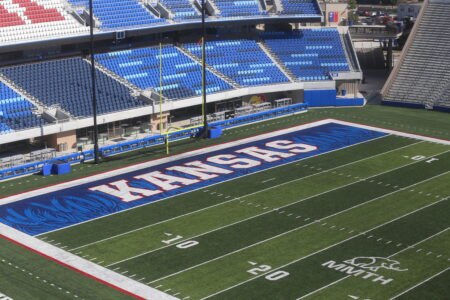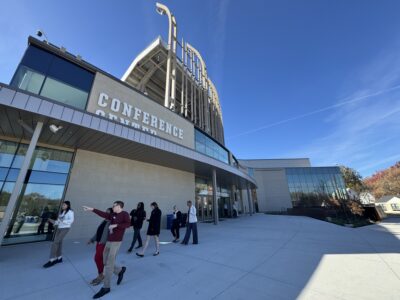KU Athletics projects deficit of $14.9 million for fiscal year 2026

photo by: Chance Parker/Journal-World photo
Athletic Director Travis Goff speaks at the press conference following KU's release of new plans to renovate David Booth Kansas Memorial Stadium on Aug. 15, 2023.
The board of directors of the University of Kansas athletic department on Wednesday approved a budget for the ongoing fiscal year 2026, projecting a $14.9 million deficit as a total of $149.9 million in expenses is expected to outweigh $135.0 million in revenue.
The projection follows an actual deficit of $11.9 million for the fiscal year 2025, which concluded on June 30. That was in fact a favorable result as compared to KU’s budget from last fall, as the department had initially expected to lose $16.8 million.
During the board’s meeting on Wednesday morning, KU Athletics Chief Financial Officer Pat Kaufman positioned these recent shortfalls as expected results of the ongoing development of KU’s Gateway project. He said officials anticipated them in a long-term forecast they had prepared when KU began the project.
“We knew at the time we were going to run a couple years of deficits while we broke the stadium in, fully completed the stadium, fully completed the east side, fully completed the conference center, fully completed the hotel and kind of started the revenue-generation machine,” Kaufman said. “We knew we had a couple years of deficits. And so thus explained kind of last year’s deficit. We’re going to take another deficit into our budget again this year.”
The expectation, Kaufman added, is for KU to potentially undergo one more deficit in the fiscal year 2027 (beginning July 1, 2026) before “conventions and conferences, hotel activity, concerts, all those types of things, plus potentially our premium seating revenues” result in surpluses beginning in the fiscal year 2028.
“When you get to 2028, the Gateway’s done, you got a hotel serving your conference center, you got an apartment complex (nearby), you got a plaza you can program, so you’re guiding to 2028 when this all gets done and then the maximum revenue generation comes out of the project,” KU CFO Jeff DeWitt said. “I think this plan reflects that, and that deficit is exactly where we thought it would be. So it is not something you see and go ‘Wow, you’re burning through your cash.’ This is intentional to land in 2028.”
One thing KU did not anticipate when it gave the stadium the green light, Kaufman said, was the advent of direct revenue sharing with student-athletes. (The House v. NCAA settlement was officially approved mere hours after KU Athletics’ previous board meeting on June 6.) That is one significant factor contributing to the projected $14.9 million shortfall for 2026, which the department expects to account for using a line of credit.
According to documentation shared at the meeting, KU plans to spend $18.9 million on revenue sharing and Alston awards during the fiscal year (compared to zero, of course, in 2025). Of note, while the revenue-sharing cap imposed by the House v. NCAA settlement is set at $20.5 million for the 2025-26 school year, KU is also furnishing about 25 new athletic scholarships, as athletic director Travis Goff has previously said. The money spent on those will be deducted from the $20.5 million cap as well.
Another significant expense for KU Athletics this fiscal year is debt service. The department is expecting to spend nearly six times as much money servicing its debt in 2026 as it did in 2025.
On the other hand, the department has found other ways to eliminate $15 million in expenses, as Goff previously said, through a variety of means on which the Journal-World has previously reported, including the gradual removal of 30 employees from the athletic department and the constraining of special events like the Kansas Relays (which will not take place in 2026) and Late Night in the Phog (which continues, but without a featured performing artist).
Budget documentation shows that KU expects to spend less on grants in aid, team travel, team operating expenses, department operating expenses, Kansas Team Health, deferred maintenance and capital projects in 2026 than it did in 2025. Those reductions offset in part the new spending on revenue sharing and debt service.
One element that is not helping KU from an operating-budget standpoint at the present moment is donor David Booth’s recent $300 million gift, $75 million of which will go toward the Gateway project.
Goff explained during Wednesday’s meeting that the department is receiving Booth’s money in the form of annual distributions. The exact size of these distributions is not yet known, he said, but it could take six or seven years for the total amount of money KU will have received from Booth to reach $75 million. As a result, the gift doesn’t immediately “leave (the department) flush with cash because the first number of years of the distributions are allocated to paying the $75 million component toward the stadium.”
He emphasized that beyond that point, the eight-figure distributions will be unrestricted (and so could factor into the operating budget).
Other key notes from the meeting
• Goff said that KU’s goal is to share official details on the second phase of the Gateway project “as we get into November.”
“We don’t have a lot of runway to finish out phase-two planning, but that’s in fact what we are all rigorously working hard on, and the project team in particular, our new developer partners in Edgemoor (Infrastructure & Real Estate) and Sunflower (Development Group),” he said. “Really, really good headway being made. Not quite ready to unveil and unleash. Focused on east-side design and elements of the south as we think about finishing out the stadium. Great progress on the hotel front, not quite a signed-on-the-dotted-line dynamic there … but close, making headway.”
Goff reiterated that the plan is for KU to demolish the east side of David Booth Kansas Memorial Stadium following the 2025 season and play football games there with reduced capacity in 2026.
• Jason Booker, KU’s deputy athletic director for external affairs and revenue generation, said of Lawrence’s ongoing bid to serve as a team base camp for the 2026 FIFA World Cup, “We would be probably shocked at this point if we don’t get a team, just on what I’ve been hearing and how we’re positioned with our facilities.”
He added that a team is set to visit the site — which centers on Rock Chalk Park and The Oread hotel — on Oct. 20, and that more teams will schedule visits between the World Cup draw in early December and the final base-camp decisions in mid- to late January.
• Goff teased the upcoming volleyball Sunflower Showdown on Oct. 24, which will be the first KU volleyball match played in Allen Fieldhouse since 2013.
“Great opportunity to far exceed our typical full-house capacity at Horejsi,” Goff said. “We won’t do that a lot, but we’ll do it occasionally, and I think this is a heck of a test ride for Coach (Matt) Ulmer and the program, and obviously the right opponent on the right night and all those other good things. Something to keep an eye out that will be here before we know it.”
• The new conference center at David Booth Kansas Memorial Stadium is drawing closer to its mid-October opening. Chancellor Douglas Girod added that the “grand official opening” will be for the football Sunflower Showdown on Oct. 25, with Governor Laura Kelly and much of the state legislature in attendance.







